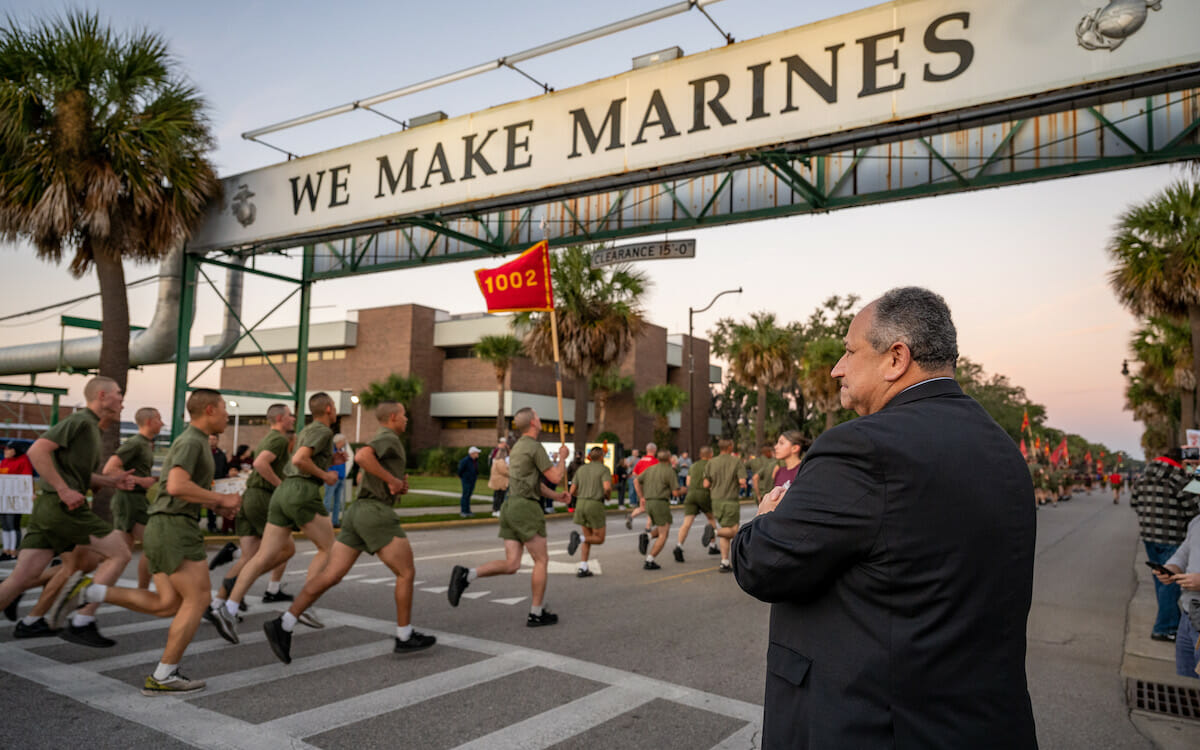From staff reports
PARRIS ISLAND — Secretary of the Navy Carlos Del Toro visited Marine Corps Recruit Depot Parris Island last week to learn more about Marine Corps recruit training and meet Marines, staff, recruits and their families.
While he was in town, Del Toro, a 22-year Navy veteran and business owner, met with small business owners and representatives of the Beaufort Regional Chamber of Commerce about the benefits and challenges of working with the federal government.
Above: Secretary of the Navy Carlos Del Toro talks to U.S. Marine Corps Recruit Brian Oates on Jan. 6, at Marine Corps Recruit Depot Parris Island. ••• Left: Secretary of the Navy Carlos Del Toro cheers while recruits complete one of their capstone events, the motivation run, Jan. 6, at Marine Corps Recruit Depot Parris Island. ••• Photos by Mass Communication Specialist 2nd Class T. Logan Keown, U.S. Navy.
About the VA’s Mental Health Services
If you are a veteran, veteran’s family member, or caregiver, you need to read the mental health information at the VA website – https://bit.ly/3tjai3J.
The VA Mental Health Services website tells veterans how to access VA mental health services for post traumatic stress disorder (PTSD), psychological effects of military sexual trauma (MST), depression, grief, anxiety, and other problems. Veterans can use some services even they are not enrolled in VA health care.
As a patient at the Ralph H. Johnson VA Medical Center (RHJVAMC), I went through the Post Traumatic Stress Disorder (PTSD) training and treatment program at the hospital in Charleston about 10 years ago. I was a typical retired service member who had suppressed and self-treated my PTSD by being a workaholic. That worked partially to keep the monsters of sleep deprivation, depression, grief, hyper vigilance, and other problems at bay for about 40 years, but eventually I knew I had to get professional help.
I was fortunate to have the RHJVAMC and its’ world class Mental Health Center to treat my PTSD and to help me learn to understand and control my PTSD. Our Lowcountry S.C. VA Mental Health Center is the flagship mental health center in the entire VA health system. The RHJVAMC was the first VA National Tele-Mental Health Hub and is, not only an ultra-modern treatment center, but also a leading-edge research center for the VA on mental health care.
The treatment provided to me by our Lowcountry VA Medical Center was God sent. The treatment was tailored to my problems, totally confidential, and successful. Parts of the treatment were difficult, but after each session with the VA’s psychologist, I felt like a ton of weight had been lifted from my shoulders.
The training was a group meeting each week with two RHJVAMC Mental Health doctors. During these meetings, I learned exactly what PTSD is and how it adversely effects many active military members, veterans, and their families.
The symptoms and effects of PTSD, including divorce and suicide were covered. I learned in the training that many veterans like myself are quite high-functioning despite their mental health problems. At the end of the training, I knew I should ask the VA to help me with coping with my military service-related suffering.
I was offered three versions of treatment or a combination of treatments, including group therapy, individual therapy, and drug treatments. I chose the individual (one-on-one) treatment track. I did not want anyone to know I was suffering from PTSD. After all, my wife called me a man’s man and I was a warrior, a highly successful police officer, I had owned two successful businesses, had been a college instructor, and I had been a regional manager in the aerospace and defense industry – and I did not want anyone to know I was having mental health problems.
I was asked by my psychologist, “Why did you not seek help when you were on active duty?”
I told her, “I was a pilot, instructor pilot, flight examiner, test pilot, and warrior. Only a fool would tell a flight surgeon he had mental health problems. I would have been instantly grounded and lose my flight play and livelihood – not to mention my self-esteem would be terribly wounded.”
When I started my treatment, I was certain that my demons were going to send me straight to hell and the best I could hope for in the next life was to be a lead-man in hell. But my VA doctor was so kind, patient, compassionate, empathetic, and helpful. She quickly brought to my attention that killing in combat is NOT murder. That alone was a tremendous relief to me, because I could not get it out of my mind that some of the folks I helped kill in Vietnam may not have been the enemy.
She also had me write down every significant emotional event (trauma) in my life. Most of my traumas were related to my military service, but not all. They included things like seeing my friends injured and killed, killing the enemy, accidentally killing what may have been innocent civilians in the battle area, being severely wounded myself, getting divorced, and other such awful experiences.
The most significant emotional event of my military life was when I was flying a COBRA attack helicopter, in a heated battle, in a free fire zone, and we came across two Vietnamese in black pajamas very near where we had just heavily engaged Viet Cong and North Vietnamese troops in the open and in Sampans. Our adrenaline levels were off the chart.
Even though I was not the fire team leader or the aircraft commander, I was instructed to “get them” with our minigun. I did, as instructed, and an hour later, when we returned to our home base, we were told we had killed two innocent farmers. This knowledge haunted me forever after the event. Having grown up on a small farm in Cottageville, S.C., and near my grandparents’ larger farm next door, I felt like I had killed people like my wonderful grandparents. Nothing I did would relieve me of this feeling of doom.
The culmination of my treatment was acknowledging in detail what bothered me. Part of the treatment was role-playing, where I sat in a chair across from two chairs where I had to act as if I were talking to the two dead Vietnamese farmers that I had killed. I had to tell them whatever I thought I would like and just have to say to them.
Then, I had to sit first in the left chair, across from the one chair where I had just been talking to the two Vietnamese, imagining I was the male farmer. I had to imagine that I was the male farmer and say to me (the retired Army Aviator) whatever I thought that he would like to say to me, his killer, if he could still talk.
Then, I had to sit in the right chair, across from the one chair where I had been talking to the two Vietnamese, imagining I was the female farmer. I had to imagine that I was the female farmer and say to me (the retired Army Aviator) whatever I thought that she would like to say to me, her killer, if she could still talk.
To say the least, this climax of my treatment was one of the toughest things I have ever done. My VA doctor listened closely and we talked about this role-playing treatment afterwards. I had other sessions and treatments. Once, I had to write a contract with myself to comeback to the VA mental health program if I ever felt like my PTSD was getting worse.
Why do I tell you this personal story?
I tell veterans and their families about my own mental health challenges and the terrific VA treatment because I do not want anymore veterans to be ill from PTSD, sexual trauma, major depressive disorder, major anxiety disorder, and other mental health conditions.
I share this story to help prevent the suffering of veterans and their families caused by drinking alcohol (one way that too many vets treat their problems) and taking drugs (legal and illegal).
I tell this story because I want to help prevent veterans from not being able to sleep, having nightmares, arguing with and mistreating their children and spouses, suffering from grief and anxiety, and getting into trouble with the law.
I want to end veterans getting divorces and committing suicide by getting veterans the best mental health care available, VA mental health care.
How can a veteran in crisis or concerned about another veteran connect with a qualified Veteran Crisis Responder? The answers are:
Call the VA’s Veterans Crisis Line at 800-273-8255 (24/7).
Text the VA’s Veterans Crisis line at 838255.
If you have hearing loss, call 800-799-4899.
Go to your nearest VA medical center. It does not matter what your discharge status is or if you are enrolled in VA health care.
Call 911.
Go to the nearest emergency room.
Call the Ralph H. Johnson VA Medical Center ‘s main number at 843-577-5011 or the Mental Health Clinic at 843-789-7311.
There is not room in one newspaper article to share all of the information available to veterans and their families at the VA’s Mental Health Services site: https://bit.ly/33aRVmD.
You will find at that site answers to frequently asked questions like:
How to schedule an appointment, and
Information about the VA tele-mental health program, peer assistance, how to schedule an appointment with the VA medical center, smart phone applications to help manage mental health, bereavement counseling, employment counseling, readjustment counseling, substance-abuse assessments and referrals, military sexual trauma counseling, and mental health resources outside of the VA.
One last and important thing. Seeking VA mental health care should not put your job or marriage at risk. All VA mental health care and medical records are protected by The Privacy and Protection Act of 1980, the Health Insurance Portability and Accountably Act (HIPPA), and VA Policies.
Do not miss out on taking advantage of the world’s leading provider of mental health care.
Larry Dandridge is a retired Lt. Col. In the U.S. Army. He is a Vietnam War era wounded warrior, a combat and 100 percent disabled veteran, a former Infantryman, former Warrant Officer and pilot. Dandridge is also a past Veterans Service Officer, and a current volunteer Patient Adviser, CEO Advisory Council Member, and Patient and Family Advisory Committee Member at the RHJ VA Medical Center, as well as a published author and free-lance writer. He can be reached at LDandridge@earthlink.net.







